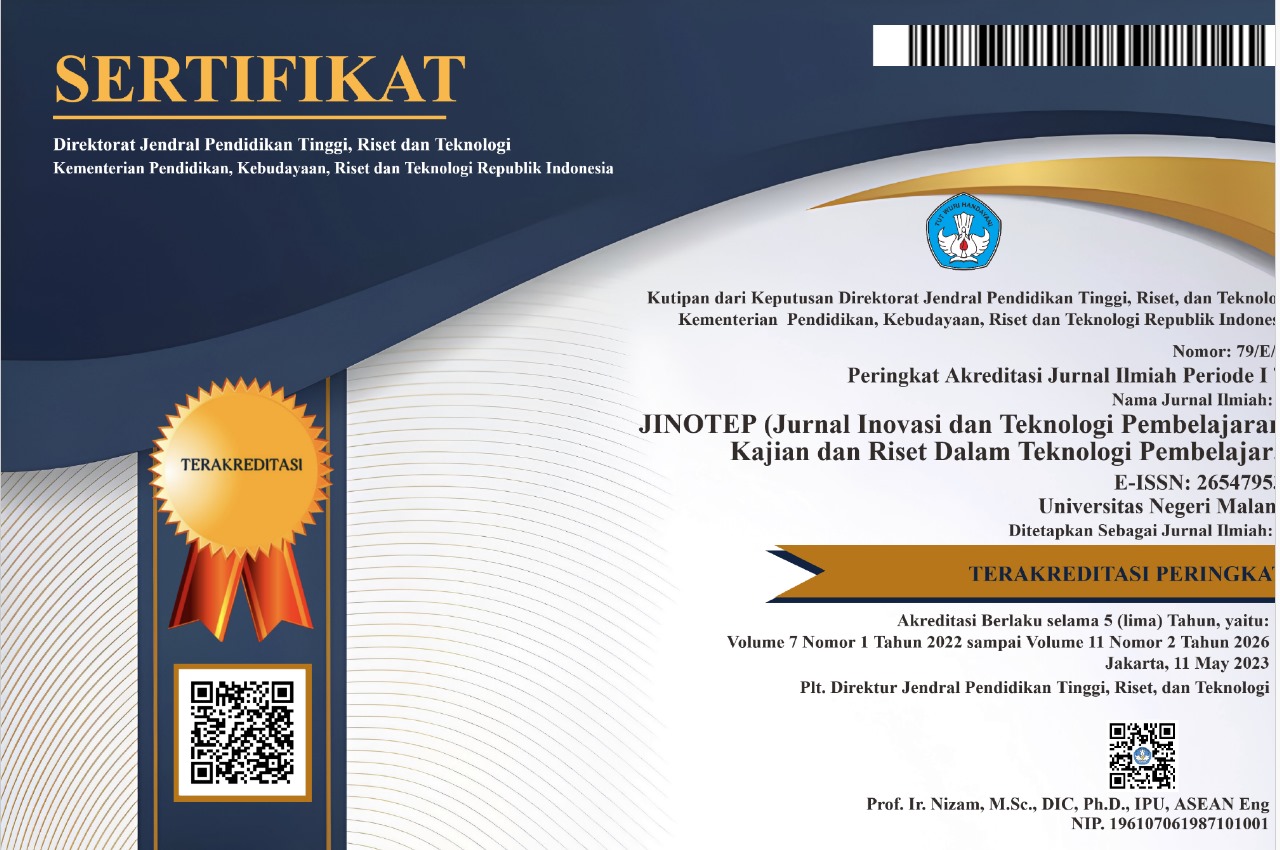Bibliometric study: Project-based learning in education on learning outcomes Scopus publication 2021-2023
Abstract
Abstrak: Project-based learning merupakan suatu bentuk kegiatan yang berfokus kepada siswa sebagai pembelajar aktif. Penelitian ini bertujuan untuk membahas project-based learning dalam dunia pendidikan dengan mengambil data dari Scopus dan mengolah metadata menggunakan aplikasi bibliometric selama rentang 3 tahun terakhir, yakni 2021-2023. Pengumpulan data pada penelitian ini dengan 4 langkah, yaitu: 1) sumber data didapat dari jurnal yang terindeks Scopus; 2) metadata jurnal yang didapatkan kemudian diunduh dalam format CSV; 3) memeriksa hasil artikel dan mengambil sesuai dengan pertanyaan penelitian; 4) mengolah data yang didapatkan menggunakan aplikasi bibliometric. Hasil penemuan terhadap artikel sebelumnya diketahui bahwa publikasi artikel tentang project-based learning merupakan pembelajaran yang banyak mendapat perhatian dan minat di bidang pendidikan, mulai tingkat pendidikan dasar hingga pendidikan tinggi, khususnya pada rentang tahun 2021-2023. Penelitian ini berguna untuk memahami status penelitian terbaru saat ini, khususnya di bidang pendidikan anak usia dini agar bisa menentukan arah penelitian yang dilakukan ke depannya.
Abstract: Project-based learning is a form of activity that focuses on students as active learners. This study aimed to discuss project-based learning in the world of education by taking data from Scopus and processing metadata using a bibliometric application for the last three years, namely from 2021-2023. The four steps to collect data of the study are: 1) data sources were obtained from Scopus-indexed journals; 2) the obtained journal metadata was then downloaded in CSV format; 3) the researchers examined the results of the articles and took them according to the research questions; 4) the researchers processed the data using the bibliometric application. The results of the findings on previous articles show that the publication of articles on project-based learning is learning that has received considerable attention and interest in education, both at the higher education level and at the initial foundation education, particularly in 2021-2023. This research is beneficial for understanding the status of the latest research, especially in early childhood education, to determine the direction of future research.
Keywords
Full Text:
PDFReferences
Asli, S., Abu-Alhiga, R., Algmal, S., & Hugerat, M. (2022). Teaching and learning about bee extinction through project-based learning (PBL): Its impact on the classroom climate (CL) among eighth grader students. Sustainability, 14(12), 7477. https://doi.org/10.3390/su14127477
Cumming, G., Fidler, F., Kalinowski, P., & Lai, J. (2012). The statistical recommendations of the American Psychological Association Publication Manual: Effect sizes, confidence intervals, and meta‐analysis. Australian Journal of Psychology, 64(3), 138–146. https://doi.org/10.1111/j.1742-9536.2011.00037.x
Ercan, F. (2023). Smart tourism destination: A bibliometric review. European Journal of Tourism Research, 34, 3409. https://doi.org/10.54055/ejtr.v34i.2788
Ghosheh Wahbeh, D., Najjar, E. A., Sartawi, A. F., Abuzant, M., & Daher, W. (2021). The role of project-based language learning in developing students’ life skills. Sustainability, 13(12), 6518. https://doi.org/10.3390/su13126518
Han, G., Liu, T., & Kang, P. (2023). Bibliometric analysis of Ewing sarcoma from 1993 to 2022. BMC Cancer, 23(1), 272. https://doi.org/10.1186/s12885-023-10723-7
Haryani, C. S., Sudi, A., & Isrok’atun. (2020). Analisis bibliometrik tren publikasi dan tingkat kolaborasi pada model situation-based learning (2010-2019). Jurnal Pena Ilmiah, 3(2), 131–140. https://doi.org/10.17509/jpi.v3i2.27384
Himawanto, H. (2016). Kajian bibliometrik terhadap artikel bidang teknologi minyak dan gas bumi di indonesia (bibliometric study of the oil and gas technology field in indonesia). Baca: Jurnal Dokumentasi Dan Informasi, 36(1), 11. https://doi.org/10.14203/j.baca.v36i1.200
Hossein-Mohand, H., Trujillo-Torres, J.-M., Gómez-García, M., Hossein-Mohand, H., & Campos-Soto, A. (2021). Analysis of the use and integration of the flipped learning model, project-based learning, and gamification methodologies by secondary school mathematics teachers. Sustainability, 13(5), 2606. https://doi.org/10.3390/su13052606
Kamil, N., & Sultan, H. (2022). Analysis of the application of project-based learning on children’s independence: Case study at the American Academy Casablanca Morocco. JOYCED: Journal of Early Childhood Education, 2(2), 186–196. https://doi.org/10.14421/joyced.2022.22-08
Khandakar, A., Chowdhury, M. E. H., Khalid, M. S., & Zorba, N. (2022). Case study of multi-course project-based learning and online assessment in electrical engineering courses during covid-19 pandemic. Sustainability, 14(9), 5056. https://doi.org/10.3390/su14095056
Lu, S.-Y., Lo, C.-C., & Syu, J.-Y. (2022). Project-based learning oriented STEAM: the case of micro–bit paper-cutting lamp. International Journal of Technology and Design Education, 32(5), 2553–2575. https://doi.org/10.1007/s10798-021-09714-1
Page, M. J., Moher, D., Bossuyt, P. M., Boutron, I., Hoffmann, T. C., Mulrow, C. D., Shamseer, L., Tetzlaff, J. M., Akl, E. A., Brennan, S. E., Chou, R., Glanville, J., Grimshaw, J. M., Hróbjartsson, A., Lalu, M. M., Li, T., Loder, E. W., Mayo-Wilson, E., McDonald, S., … McKenzie, J. E. (2021). PRISMA 2020 explanation and elaboration: updated guidance and exemplars for reporting systematic reviews. BMJ, 372, n160. https://doi.org/10.1136/bmj.n160
Paristiowati, M., Rahmawati, Y., Fitriani, E., Satrio, J. A., & Hasibuan, N. A. P. (2022). Developing Preservice chemistry teacher’s engagement with sustainability education through an online project-based learning summer course program. Sustainability, 14(1783), 1–18. https://doi.org/10.3390/su14031783
Peng, J., Yuan, B., Sun, M., Jiang, M., & Wang, M. (2022). Computer-based scaffolding for sustainable project-based learning: Impact on high-and low-achieving students. Sustainability, 14(19), 12907. https://doi.org/10.3390/su141912907
Pritchard, A. (1969). Statistical Bibliography; An Interim Bibliography.
Salam, S., & Senin, A. A. (2022). A bibliometric study on innovative behavior literature (1961–2019). SAGE Open, 12(3), 215824402211095. https://doi.org/10.1177/21582440221109589
Santoso, R. T. P. B., Priyanto, S. H., Junaedi, I. W. R., Santoso, D. S. S., & Sunaryanto, L. T. (2023). Project-based entrepreneurial learning (PBEL): a blended model for startup creations at higher education institutions. Journal of Innovation and Entrepreneurship, 12(1), 18. https://doi.org/10.1186/s13731-023-00276-1
Surahman, E., & Wang, T. (2022). Academic dishonesty and trustworthy assessment in online learning: A systematic literature review. Journal of Computer Assisted Learning, 38(6), 1535–1553. https://doi.org/10.1111/jcal.12708
Tambunan, H. B., Priambodo, N. W., Hartono, J., Aditya, I. A., Triani, M., & Rasgianti, R. (2023). Research trends on microgrid systems: a bibliometric network analysis. International Journal of Electrical and Computer Engineering (IJECE), 13(3), 2529. https://doi.org/10.11591/ijece.v13i3.pp2529-2545
Tandon, A., Kaur, P., Mäntymäki, M., & Dhir, A. (2021). Blockchain applications in management: A bibliometric analysis and literature review. Technological Forecasting and Social Change, 166(2), 120649. https://doi.org/10.1016/j.techfore.2021.120649
Terrón-López, M.-J., Velasco-Quintana, P. J., Lavado-Anguera, S., & Espinosa-Elvira, M. del C. (2020). Preparing sustainable engineers: a project-based learning experience in logistics with refugee camps. Sustainability, 12(12), 4817. https://doi.org/10.3390/su12124817
Umar, M., & Ko, I. (2022). E-Learning: Direct effect of student learning effectiveness and engagement through project-based learning, team cohesion, and flipped learning during the covid-19 pandemic. Sustainability, 14(1724), 1–20. https://doi.org/10.3390/su14031724
Vlase, I., & Lähdesmäki, T. (2023). A bibliometric analysis of cultural heritage research in the humanities: The Web of Science as a tool of knowledge management. Humanities and Social Sciences Communications, 10(1), 84. https://doi.org/10.1057/s41599-023-01582-5
Wang, W., Dong, X., Qu, J., Lin, Y., & Liu, L. (2021). Bibliometric analysis of microtia-related publications from 2006 to 2020. Ear, Nose & Throat Journal, 1(5), 014556132110376. https://doi.org/10.1177/01455613211037641
Wróblewska, D., & Okraszewska, R. (2020). Project-based learning as a method for interdisciplinary adaptation to climate change—reda valley case study. Sustainability, 12(11), 4360. https://doi.org/10.3390/su12114360
Zhou, L., & Li, J. (2022). Developing core competence with project-based learning: voices from chinese high school students serving visually impaired students. ECNU Review of Education, 5(2), 383–389. https://doi.org/10.1177/20965311211005478
DOI: http://dx.doi.org/10.17977/um031v10i22023p201
Refbacks
- There are currently no refbacks.
Copyright (c) 2023 Nurhusna Kamil, Haseena Sultan, Syahrul Ramadhan

This work is licensed under a Creative Commons Attribution-ShareAlike 4.0 International License.
======================================================================
Jurnal Inovasi dan Teknologi Pembelajaran published by Universitas Negeri Malang in collaboration with the Asosiasi Program Studi Teknologi Pendidikan Indonesia (APS TPI) and Ikatan Profesi Teknologi Pendidikan Indonesia (IPTPI) with a MoU.
Publisher Address:
Educational Technology Laboratorium, Building D5, 1st Floor
Faculty of Education, Universitas Negeri Malang
Semarang St. No. 5, Malang City, East Java Province, Postal Code 65145
Email: jinotep.fip@um.ac.id
======================================================================

JINOTEP is licensed under a Creative Commons Attribution-ShareAlike 4.0 International License.
JINOTEP Statistics (Since July 13th, 2020)



.png)




.png)
1.png)
1.png)
4.png)
2.png)
1.png)
1.png)
.png)


_3.png)





1.png)
.png)